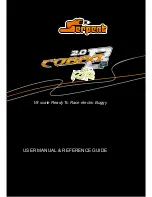
7
Rear camber
Front camber
Front caster
Rear anti roll-bar
Front anti roll-bar
Gear-ratio
Ackermann
Basic Tuning
Springs
Shock-angle
g
Springs:
by using a softer spring you will have more sag, more chassis
roll/lean, more dive and a less responsive car this might be better on low-grip
surfaces; by using a harder spring you have less sag, less body lean, less dive
and a more responsive car. What to apply depends on driving style and
grip-level surface. This is more suitable on high-grip surfaces.
g
Shock-angle:
the angle at which the shocks are mounted create a different
suspension feel; the more vertical, the harder it feels, the more horizontal,
the softer it feels.
g
Oil:
the viscosity of the shock-oil defines the dampening of the shockabsorber.
Thinner oil will be softer, with slower response, thicker oil will be harder
dampening with faster reponse. The dampening can also be fine-tuned by
fitting other pistons with more or less holes, which is an optional.
g
Differential:
you can make the gear differential harder or softer by using a
different oil viscosity. Lighter oil will create a looser diff which increases rear
traction on acceleration, but also more understeer , and a harder differential
will decreases rear traction on acceleration, but also more on-throttle steering
g
Front anti-roll bar:
by using a softer anti-roll bar you will have more sag,
more chassis roll/lean, more dive and a less responsive car. But you will
have more steering once you have entered the corner
g
Rear anti-roll bar:
by using a softer anti-roll bar you will have more sag,
more chassis roll/lean, more dive and a less responsive car. But you will
have more rear traction and a more stable car
g
Toe adjustment: Front:
adjusted with the track-rods, make longer
or shorter. More toe-in will create more steering, but less stability;
toe-out will create a more stabile car, with less steering.
g
Toe adjustment: Rear:
adjusted with suspension blocks (optional).
More toe-in will create more traction, more stability, but less speed.
Less toe in will create a less stabile car, with less traction but higher speed.
g
Front camber:
using more negative camber in the front will give you more
steering but also increases possible traction roll.
g
Rear camber:
using more negative camber in the rear will create more grip
in the rear meaning also creating more understeer.
g
Front caster:
use optional caster blocks to change caster, more caster will
create more steering but also increases possible traction roll. And less caster
will create less steering but also decreases possible traction roll.
g
Wheel-base length:
a longer car will be more stabile and react slower,
a shorter car will be more nervous and more direct.
g
Gear-ratio:
spur and pinion: for correct gearmesh keep a pieces of notebook
paper at hand, to put between the spur and pinion for correct mesh.
g
Ride-height:
you can change the ride-height of the car, by applying more or
less pre-load on the springs, turn the pre-load adjusters to set the desired
height and keep left and right the same.
Rear caster
Rear
camber link
Speedcontroller
Shocktower rear
Race-tyres


































